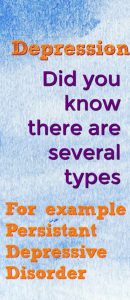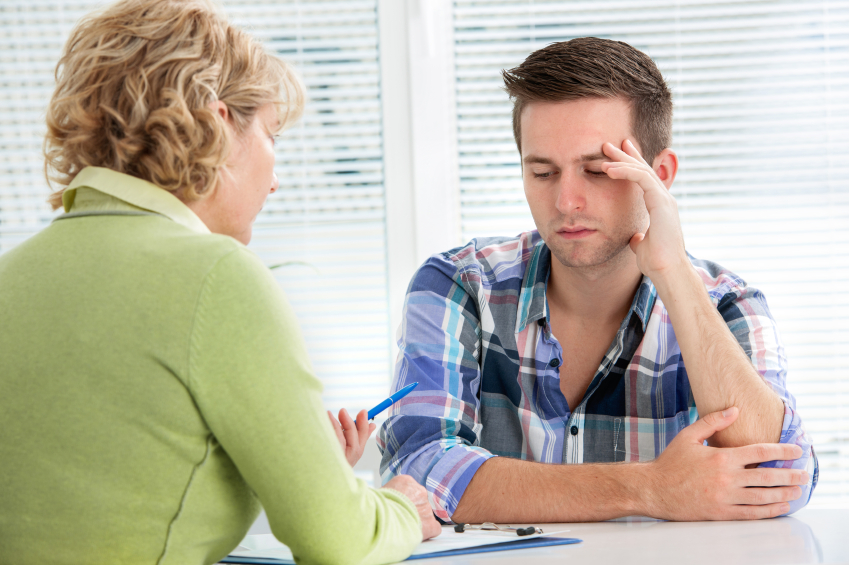Depression is more than just being sad — it is a treatable illness. People with depressive issues do not all have the same symptoms. However, the major signs include:
- Feelings of hopelessness
- Irritability and restlessness
- Persistent sad or an “empty” feelings
- Loss of interest in activities that were once enjoyable
- Decreased energy or constantly feeling tired
- Trouble concentration and making decisions
- Feelings of guilt, worthlessness or helplessness
- Weight loss or gain (caused by overeating or loss of appetite)
- Aches or body pains
- Thoughts of suicide or a suicide attempt
Causes
Depression appears to be caused by a combination of genetic, biological, environmental and psychological factors. Some types tend to run in families. However, trauma, loss of a loved, one, a difficult relationship, or any stressful situation may trigger a depressive episode.  Another episode may occur with or without an obvious cause.
Another episode may occur with or without an obvious cause.
There are several different forms of depression:
Major depression – severe symptoms that interfere with your ability to work, sleep, study and enjoy life. An episode can occur only once in a person’s life but more commonly, a person has several episodes.
Persistent depressive disorder – depressed mood that lasts for a year or more.
Bipolar disorder – also called manic-depressive illness. It is characterized by cycling mood changes that range from extreme highs to extreme lows.
Depression Treatments
Depression, even the most severe cases, can be effectively treated. The earlier that treatment can begin the more effective it is.
The first step to getting treatment is to connect with a mental health specialist. Once diagnosed, a person with depression can be treated in several ways. The most common treatments are medication and psychotherapy.
For Yourself
If you have depression, you may feel exhausted and hopeless. It may be really hard to take any action to help yourself. But as you begin to recognize your depression and begin treatment, you will start to feel better.
If you are unsure where to go for help, contact us.
If you are thinking of harming yourself – seek help NOW! Do not allow yourself to be alone.
If you are only mildly depressed – do not wait too long to get evaluated or treated. There is research showing the longer one waits, the greater the impairment can be down the road. Contact us as soon as possible.
Before your treatment starts, there are things you can do:
- Try to be active and exercise. Go to a movie, a ballgame, or another event or activity that you once enjoyed.
- Set realistic goals for yourself.
- Break up large tasks into small ones, set some priorities and do what you can as you can.
- Try to spend time with other people and confide in a trusted friend or relative. Try not to isolate yourself, and let others help you.
- Expect your mood to improve gradually, not immediately. Do not expect to suddenly “snap out of” your depression. Often during treatment for depression, sleep and appetite will begin to improve before your depressed mood lifts.
- Postpone important decisions, such as getting married or divorced or changing jobs, until you feel better. Discuss decisions with others who know you well and have a more objective view of your situation.
- Remember that positive thinking will replace negative thoughts as your depression responds to treatment.
- Continue to educate yourself about depression.
- Contact us for help.
There are many different resources. We can help you find the right fit, by looking at:
- Mental health specialists, such as psychiatrists, psychologists, social workers, or mental health counselors
- Health maintenance organizations
- Community mental health centers
- Hospital psychiatry departments and outpatient clinics
- State hospital outpatient clinics
- Family services, social agencies, or clergy
- Peer support groups
- Private clinics and facilities
Call us now so we can help you choose what is right for you.
When does depression start?
Young children and teens can get depression but it can occur at other ages also. Depression is more common in women than in men, but men do get depression too. Loss of a loved one, stress, and hormonal changes, or traumatic events may trigger depression at any age.
Medications for Depression
Medications help balance chemicals in the brain called neurotransmitters. Although scientists are not sure exactly how these chemicals work, they do know they affect a person’s mood. Types of antidepressant medications that help keep the neurotransmitters at the correct levels are:
- SSRIs (selective serotonin reuptake inhibitors)
- SNRIs (serotonin and norepinephrine reuptake inhibitors)
- MAOIs (monoamine oxidase inhibitors)
- Tricyclics.
These different types of medications affect different chemicals in the brain.
Sometimes several different types have to be tried before finding the one that works. If you start taking medication, tell your doctor about any side effects right away. Depending on which type of medication, possible side effects include:
- Headache
- Nausea
- Insomnia and nervousness
- Agitation or feeling jittery
- Sexual problems
- Dry mouth
- Constipation
- Bladder problems
- Blurred vision, or
- Drowsiness during the day.
How can I find treatment and who pays?
Most insurance plans cover treatment for depression. Check with your own insurance company to find out what type of treatment is covered. If you don’t have insurance, local city or county governments may cover treatment at a clinic or health center, where the cost is based on income. Medicaid plans also may pay for depression treatment.
If you are unsure where to go for help, ask your family doctor. Others who can help are:
- Psychiatrists, psychologists, licensed social workers or licensed mental health counselors
- Health maintenance organizations
- Community mental health centers
- Hospital psychiatry departments and outpatient clinics
- Mental health programs at universities or medical schools
- State hospital outpatient clinics
- Family services, social agencies or clergy
- Peer support groups
- Private clinics and facilities
- Employee assistance programs
- Local medical and/or psychiatric societies.You can also check a search engine or even an old-fashion phone book under “mental health,” “health,” “social services,” “hotlines,” or “physicians” for phone numbers and addresses. An emergency room doctor also can provide temporary help and can tell you where and how to get further help.
Why do people get depression and others don’t?
There is no single cause of depression. Depression happens because of a combination of things including:
genes – some types of depression tend to run in families. Genes are the “blueprints” for who we are, and we inherit them from our parents. Scientists are looking for the specific genes that may be involved in depression.
brain chemistry and structure – when chemicals in the brain are not at the right levels, depression can occur. These chemicals, called neurotransmitters, help cells in the brain communicate with each other. By looking at pictures of the brain, scientists can also see that the structure of the brain in people who have depression looks different than in people who do not have depression. Scientists are working to figure out why these differences occur.
environmental and psychological factors – trauma, loss of a loved one, a di cult relationship, and other stressors can trigger depression. Scientists are working to figure out why depression occurs in some people but not in others with the same or similar experiences. ey are also studying why some people recover quickly from depression and others do not.
What if I or someone I know is in crisis?
If you are thinking about harming yourself, or know someone who is, tell someone who can help immediately.
- Call your doctor.
- Call 911 or go to a hospital emergency room to get immediate help or ask a friend or family member to help you do these things.
- Call the toll-free, 24-hour hotline of the National Suicide Prevention Lifeline at 1-800-273-TALK (1-800-273-8255); TTY: 1-800-799-4TTY (4889) to talk to a trained counselor.
- Make sure you or the suicidal person is not left alone.
